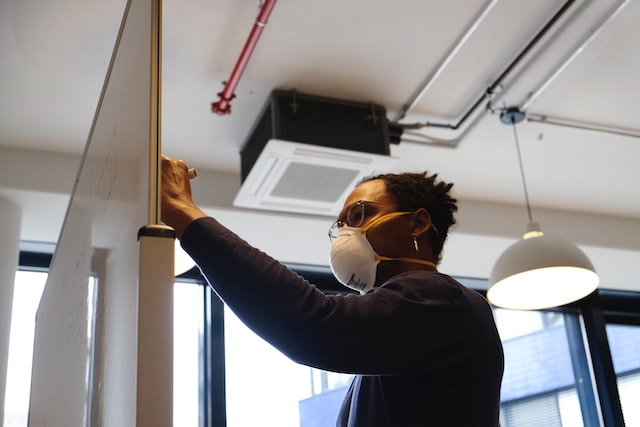World's First Climate Change Patient?
A woman in Canada has recently been the first to be diagnosed with health complications as a direct result of climate-change-induced weather experience. Dr Kyle Merrit...
Read Full Article
The Building Engineering Services Association (BESA) says it is surprised that changes to pollution laws announced by the government ignore the importance of indoor air quality (IAQ) and do not reflect the latest advice from the World Health Organisation (WHO).
The Association welcomed new measures from the Department for Food, the Environment and Rural Affairs (DEFRA) aimed at helping local authorities create clean air zones under the terms of the new Environment Act, but said it was “puzzled” by the failure to include IAQ.
“The government cannot continue missing opportunities to progress readily available measures for creating safe havens.”
– Nathan Wood
Chair, Health & Well-being in Buildings group, BESA
“BESA, along with other industry bodies and many health professionals, has been urging the government to use its new powers under the Act to mandate higher standards of IAQ – so this is another missed opportunity,” said Nathan Wood, chair of BESA’s Health & Well-being in Buildings group.
“There is now a wealth of guidance freely available to help building managers achieve healthier and safer indoor environments quickly and cost-effectively. It is hard to understand, therefore, why this is not being mandated particularly considering all that we learned during the pandemic about the importance of good ventilation, for example.”
BESA has published three pieces of free guidance outlining practical measures to tackle the specific challenge of reducing airborne contaminants inside buildings. It points out that, as people spend more than 90 per cent of their time indoors, it is increasingly urgent that more time and money is spent on addressing IAQ.
Its guidance has been adopted by a coalition of trade unions and scientists as part of an ‘employers’ pledge’ to improve conditions in workplaces following the pandemic – and was the basis of BESA’s response to the DEFRA consultation about the new measures.
As well as setting more ambitious targets for reducing general pollution, the Association believes the government should set specific targets for IAQ so that buildings can become safe havens that enhance the health, well-being, and productivity of occupants while the longer-term work of cleaning up the external environment goes on.
The government has designated National Highways as the first "relevant authority" with a statutory duty to develop plans for reducing road pollution and has brought in requirements for local authorities to declare air quality management areas with deadlines for reducing pollution.
However, it has retained its headline target to halve the limit on fine particles (PM2.5) in England from an annual average of 20 to 10 micrograms per cubic metre of air by 2040 – but this is double the level recommended by the WHO.
“Numerous studies have shown that PM2.5 contributes to heart attacks and strokes – and increases the risk of severe asthma cases and lung cancer,” said Wood, who will be chairing a major panel discussion on the topic of healthy buildings at the BESA National Conference in October.
“Surely, our national targets should be aligned with the WHO’s advice at the very least. Also, setting a goal 18 years into the future condemns another whole generation of children to impaired lung function and increasingly severe asthma attacks.
“The Environment Act should be the vehicle for setting a new healthy standard for indoor spaces,” said Wood. “The government cannot continue missing opportunities to progress readily available measures for creating safe havens.”
Picture: a person in a mask writing on a board. Image credit: Unsplash.
Article written by Bailey Sparkes | Published 31 August 2022
A woman in Canada has recently been the first to be diagnosed with health complications as a direct result of climate-change-induced weather experience. Dr Kyle Merrit...
Read Full ArticleClean Air Day is the UK's largest air pollution campaign, bringing together communities, businesses, schools and the health sector. Watch the...
Read Full ArticleScientists at the University of Birmingham and sound artist Robert Jarvis have worked together to create three musical compositions created using air quality...
Read Full ArticleTwo new pieces of guidance on reducing COVID-19 transmission through ventilation and air cleaning technologies have been issued by the Chartered Institution of Building...
Read Full ArticleA report commissioned by the government’s chief scientific adviser Sir Patrick Vallance has highlighted the crucial role played by building ventilation in...
Read Full ArticleLast month was National Clean Air Month in the US. Why is air quality important? The pandemic has brought consideration of clean air to the public eye, but the quality...
Read Full Article3 million working days a year are lost to air pollution under current targets, according to a report commissioned by the Clean Air Fund. The new study,...
Read Full ArticleA policy paper launched at the Building Engineering Services Association’s World Ventilation Day event suggests there is a “two-year window of...
Read Full ArticleAn awareness day to promote the impact of humidity control in our daily lives and the buildings we live and work in has launched. The Humidity Control Group, a...
Read Full ArticleNew research shows that asthmatics in Oxford had fewer hospital stays in 2020, largely due to reduced air pollution during the national lockdown. Falling...
Read Full Article